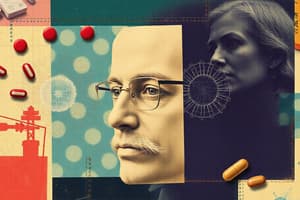Podcast
Questions and Answers
What is pharmacology?
What is pharmacology?
The study of interaction of drugs with living organisms.
What does the term 'prescriber' refer to?
What does the term 'prescriber' refer to?
Any health care professional licensed to prescribe medications.
Which of the following is not one of the six elements a prescriber must check?
Which of the following is not one of the six elements a prescriber must check?
- Medical history (correct)
- Patient's name
- Prescriber's signature
- Date drug order was written
Define medication error.
Define medication error.
What is an adverse effect?
What is an adverse effect?
What does an allergic reaction refer to?
What does an allergic reaction refer to?
Additive effects occur when the total effect of two or more drugs is less than the sum of their individual effects.
Additive effects occur when the total effect of two or more drugs is less than the sum of their individual effects.
What restricts the passage of certain chemicals between the bloodstream and the central nervous system?
What restricts the passage of certain chemicals between the bloodstream and the central nervous system?
What is a contraindication?
What is a contraindication?
What is the process called by which solid forms of drugs disintegrate in the gastrointestinal tract?
What is the process called by which solid forms of drugs disintegrate in the gastrointestinal tract?
What does drug-induced teratogenesis refer to?
What does drug-induced teratogenesis refer to?
What is the first-pass effect?
What is the first-pass effect?
Define half-life in pharmacokinetics.
Define half-life in pharmacokinetics.
Which of the following best describes an idiosyncratic reaction?
Which of the following best describes an idiosyncratic reaction?
What does intraarterial mean?
What does intraarterial mean?
What is meant by incompatibility in pharmacology?
What is meant by incompatibility in pharmacology?
Study Notes
Fundamental Concepts of Pharmacology
- Pharmacology encompasses the study of drug interactions with living organisms, including drug history, sources, physicochemical properties, and dosage forms.
- It covers processes such as drug absorption, distribution, mechanism of action, biotransformation, excretion, clinical uses, and adverse effects.
Definitions and Terminology
- Pharmaco- refers to "drug" or "medicine."
- Variants include dynamics, genomics, gnosy, and kinetics.
- A prescriber is a licensed healthcare professional authorized to prescribe medications.
Six Elements for Prescribing
- Patient's name must be included.
- Date the drug order was written is required.
- The specific drugs prescribed must be listed.
- Dosage amount and frequency are crucial components.
- Route of administration should be specified.
- Prescriber's signature is necessary.
Medication Errors and Adverse Effects
- Medication error refers to any preventable adverse drug event associated with inappropriate medication use.
- Adverse effects are undesirable reactions directly resulting from drug usage.
- Allergic reactions represent immunologic hypersensitivity to a drug.
Drug Interactions and Effects
- Additive effects occur when drugs with similar actions combine to produce their effects equal to the sum of the individual drugs' effects.
- Drug interactions alter the pharmacologic or pharmacokinetic activity due to the presence of additional drugs, often affecting metabolic enzymes.
- Drug effects include both therapeutic and toxic reactions, often described in terms of onset, peak, and duration.
Drug Properties and Pharmacokinetics
- Chemical name describes a drug’s molecular structure and composition.
- Blood-brain barrier restricts the passage of substances between the bloodstream and the central nervous system.
- Dissolution is the process of drug solid forms breaking down in the gastrointestinal tract for absorption.
- Duration of action refers to how long a drug concentration remains sufficient to elicit a response.
Pharmacology Terms
- The first-pass effect refers to initial liver metabolism of a drug before it reaches systemic circulation.
- A generic name is a simpler, nonproprietary name for a drug, not protected by trademark.
- Half-life is the time required for half of a drug dose to be eliminated from the body.
Reactions and Injections
- Idiosyncratic reaction describes an unusual and unexpected response to medication, distinct from allergic reactions.
- Intraarterial refers to procedures or injections within an artery.
- Incompatibility indicates a reaction when two parenteral drugs are mixed, possibly leading to chemical deterioration.
Injection Types
- Intraarticular refers to injections within a joint.
- Intrathecal denotes administration within a sheath, such as an injection into the spinal cord's subarachnoid space.
Studying That Suits You
Use AI to generate personalized quizzes and flashcards to suit your learning preferences.
Description
This quiz covers essential pharmacological concepts including drug interactions, dosage forms, and the processes involved in drug action and administration. It also highlights key terminology and the critical elements necessary for prescribing medications safely. Test your knowledge on medication errors and their impact on clinical practice.




